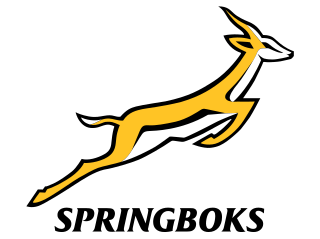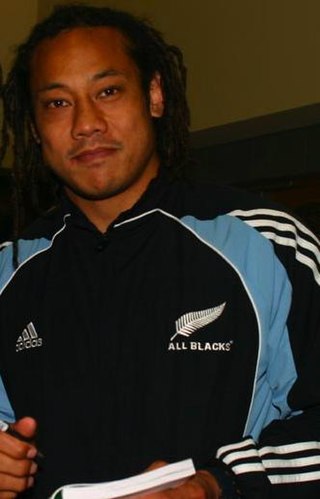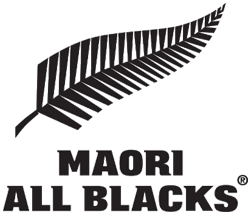
The New Zealand national rugby union team, commonly known as the All Blacks, represents New Zealand in men's international rugby union, which is considered the country's national sport. Famed for their international success, the All Blacks have often been regarded as one of the most successful sports teams in history.

Haka are a variety of ceremonial dances in Māori culture. A performance art, haka are often performed by a group, with vigorous movements and stamping of the feet with rhythmically shouted accompaniment. Haka have been traditionally performed by both men and women for a variety of social functions within Māori culture. They are performed to welcome distinguished guests, or to acknowledge great achievements, occasions, or funerals.

The South Africa national rugby union team, commonly known as the Springboks, is the country's national team governed by the South African Rugby Union. The Springboks play in green and gold jerseys with white shorts, and their emblem is the Springbok, a native antelope and the national animal of South Africa. The team has represented South African Rugby Union in international rugby union since 30 July 1891, when they played their first test match against a British Isles touring team. Currently, the Springboks are the reigning World Champions, having won the World Cup a record four times. South Africa have won half of the Rugby World Cups they have participated in and are also the second nation to win the World Cup consecutively.

Jonathan Ionatana Falefasa Umaga is a New Zealand former rugby union footballer and former captain of the national team, the All Blacks. He is head coach of Moana Pasifika in the Super Rugby competition.
The Tonga national rugby union team represents the Tonga Rugby Union in men's international rugby union. The team is nicknamed ʻIkale Tahi . Like their Polynesian neighbours, the Tongans start their matches with a traditional challenge – the Sipi Tau. They are members of the Pacific Islands Rugby Alliance (PIRA) along with Fiji and Samoa. The Ikale Tahi achieved a historic 19–14 victory over France in the 2011 Rugby World Cup, but having lost to New Zealand and Canada, were unable to achieve what would have been their first-ever presence at the quarter-finals.

Sir Wayne Thomas "Buck" Shelford is a former New Zealand rugby union footballer and coach who represented and captained New Zealand in the late 1980s. He is also credited with revitalising the performance of the All Blacks' traditional "Ka Mate" haka.

"Ka Mate" is a Māori haka composed by Te Rauparaha, the historic leader of the iwi of Ngāti Toa of the North Island of New Zealand during the Musket Wars.

Piri Awahou Tihou Weepu is a retired New Zealand rugby union player. Weepu played most recently for Wairarapa Bush in the Heartland Championship. Generally Weepu played as a half-back but also played at first five-eighth on occasion. He has represented the New Zealand national side, the All Blacks, between 2004 and 2013. He first won national honours against Wales in 2004. In 2005 was called back into the All Blacks squad for the first Tri Nations test against South Africa, having missed selection for the 2005 British & Irish Lions tour. He represented the Hurricanes and Blues in Super Rugby, and Wellington and Auckland in the Mitre 10 Cup. He also had brief spells with several clubs in Europe. In October 2017, Weepu announced his retirement as a rugby player.

The New Zealand women's rugby union team, called the Black Ferns, represents New Zealand in women's international rugby union, which is regarded as the country's national sport. The team has won six out of nine Women's Rugby World Cup tournaments.

The 2006 Tri Nations Series was the 10th Tri Nations Series, an annual rugby union competition between the national teams of Australia, New Zealand and South Africa. New Zealand won the competition with three rounds still to play after their victory over Australia on 19 August, their 21st consecutive home win.

Keven Filipo Mealamu is a former New Zealand rugby union footballer. He played at hooker for the Blues in Super Rugby, Auckland in the National Provincial Championship, and the New Zealand national team. He was part of the Blues team that won the 2003 Super 12 title, the third for the franchise. He was a key member of 2011 and 2015 Rugby World Cup winning teams, becoming one of only 21 players who have won the Rugby World Cup on multiple occasions.

The Māori All Blacks, previously called the New Zealand Maori, New Zealand Maoris and New Zealand Natives, are a rugby union team from New Zealand. They are a representative team of the New Zealand Rugby Union, and a prerequisite for playing is that the player has Māori whakapapa (genealogy). In the past this rule was not strictly applied; non–Māori players who looked Māori were often selected in the team. These included a few Pacific island players and a couple of African descent. Today all players have their ancestry verified before selection in the team.
Haka, traditional dances of the Māori people, have been used in sports in New Zealand and overseas. Haka are performed to challenge opponents before matches. The dance form has been adopted by the New Zealand national rugby union team, the "All Blacks", the Māori All Blacks, New Zealand women's national rugby union team, the "Black Ferns" and a number of other New Zealand national teams perform before their international matches; some non-New Zealand sports teams have also adopted haka.

Carl Joseph Hayman is a retired New Zealand rugby union footballer who played at tighthead prop. Hayman has previously played for the Highlanders in Super Rugby, Otago in the NPC, and Newcastle Falcons in the English Premiership, as well as making 45 appearances for New Zealand at international level. Hayman announced his retirement from professional rugby in January 2015, aged 35. Post retirement Hayman has been diagnosed with early-onset dementia and probable chronic traumatic encephalopathy.

Liam Justin Messam is a New Zealand rugby union player who plays TOP14 for RC Toulonnais. In Super Rugby, he previously played for the Chiefs, and for Waikato in the ITM Cup. Messam predominantly plays as a blindside flanker but can fill in at Number 8 as well as openside flanker. After the retirement of then Chiefs captain Mils Muliaina, Messam was named the team's new co-captain from 2012 onwards, alongside Aaron Cruden.
Although haka is a traditional dance form of the Māori people of New Zealand, the use of a haka by the All Blacks rugby team before matches has made it familiar worldwide, and various haka have been adopted by sports teams outside New Zealand, particularly American football teams in the United States. Though some teams do contain Māori players, frequently haka have been performed by teams with players from other Polynesian groups, indicating that the performance art has become part of a pan-Polynesian sports culture.

Aaron Luke Smith is a New Zealand professional rugby union player. A scrum half, Smith played for the Highlanders in Super Rugby where upon retirement in 2023 was the club's all time leader in caps, and for Manawatu in the ITM Cup. He has won 124 caps for New Zealand and is their 2nd most-capped back after Beauden Barrett.
The 2011 Rugby World Cup Final was a rugby union match between France and New Zealand, to determine the winner of the 2011 Rugby World Cup. The match took place on 23 October 2011 at Eden Park, in Auckland, New Zealand. New Zealand won the match 8–7, the smallest margin by which any Rugby World Cup final has been decided.

Thomas Tekanapu Rawakata Perenara, commonly known as TJ Perenara, is a New Zealand rugby union player who plays as a Halfback for the Black Rams Tokyo in the Japan Rugby League One. He has previously played for the Hurricanes in Super Rugby and Wellington in the Bunnings NPC. Perenara is the most capped Hurricane of all time with 163 caps. Perenara made his international debut for New Zealand in 2014 and has since played in 88 test matches.

Codie Joshua Dane Taylor is a New Zealand professional rugby union player, who currently plays as a hooker for the Crusaders in Super Rugby and is contracted to Canterbury for New Zealand's domestic National Provincial Championship competition. He represents New Zealand internationally.

















